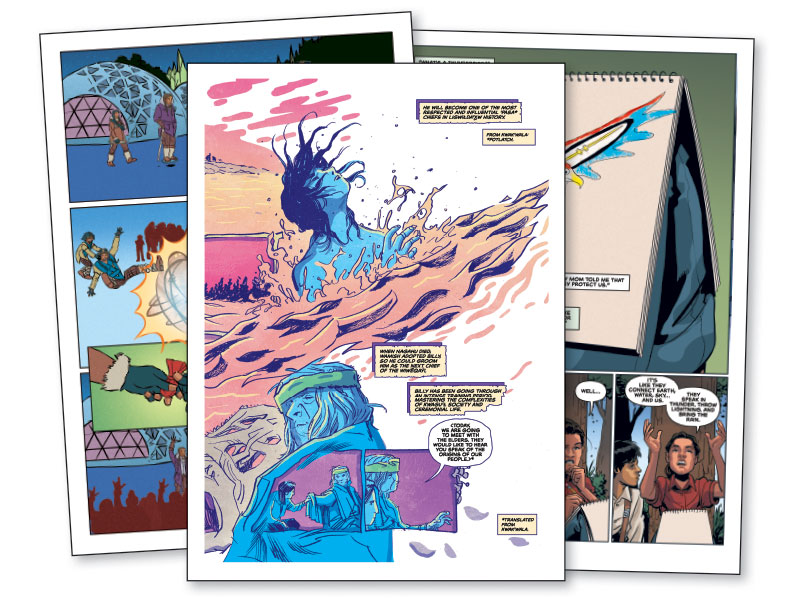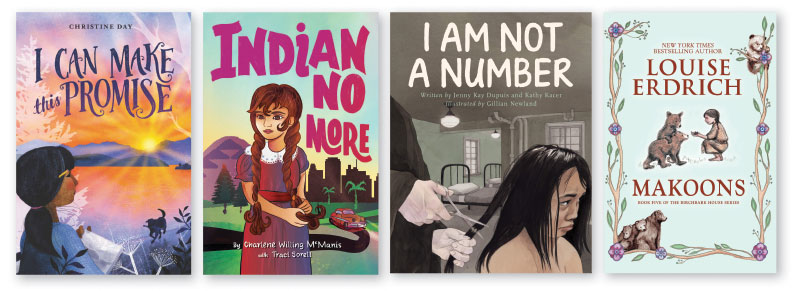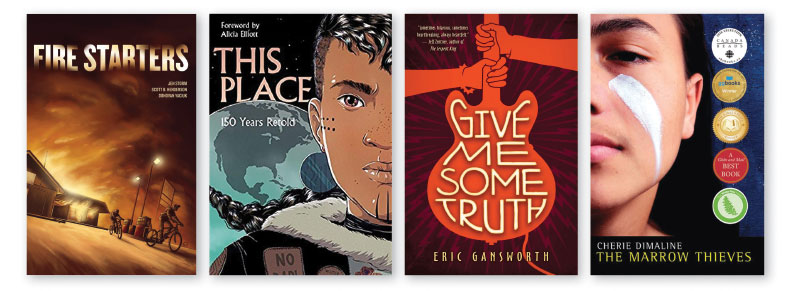Native Stories: Books for tweens and teens by and about Indigenous peoples
Twelve wonderful middle grade and young adult #OwnVoices titles that reflect Indigenous life and culture. They include historical and contemporary fiction as well as anthologies, graphic novels, and speculative science fiction.
 |
From This Place: 150 Years Retold by Kateri Akiwenzie-Damm & others, center image illus. by Kyle Charles, Highwater Press 2019. |
Gearing up for a new school year and new reads is exciting, and this year is no exception. Check out some recent Native “firsts”:
- In November 2018, Deb Haaland (Laguna Pueblo) and Sharice Davids (Ho-Chunk) became the first Native American women to serve in Congress.
- Dr. Debbie Reese (Nambé Pueblo), coauthor of this article, was selected as the first Native Arbuthnot Honor Lecturer by the Association for Library Service to Children (ALSC) in April 2019.
- Three Indigenous #OwnVoices picture books made the ALSC 2019 Notable Children’s Books list.
- We Are Grateful/Otsaligeliga by Traci Sorell (Cherokee) was the first Native-authored book to receive recognition from multiple book award committees, garnering Sibert, Orbis Pictus, and Boston Globe-Horn Book honors.
All of the above makes this is an especially great time to share these accomplishments with students and dive into books that challenge the usual narrative about Indigenous people.
Below are wonderful middle grade and young adult #OwnVoices titles that will help readers understand Indigenous life and culture. They include historical and contemporary fiction as well as anthologies, graphic novels, and speculative science fiction.
Each year we are pleased to see more Native authors getting published. In addition to our recommendations here, we suggest that librarians and educators seek out the American Indian Library Association’s Youth Literature Award list, read critical reviews at American Indians in Children’s Literature , and explore interviews with Native writers, illustrators, and editors at Cynsations, a resource-filled website maintained by author Cynthia Leitich Smith (Muscogee Nation).

Middle Grade
DAY, Christine. I Can Make This Promise. Candlewick. 2019. ISBN 978006 2872036.
It’s the summer between sixth and seventh grades, and while Edie and her friends are in her attic, they find a box with photos of someone who looks a lot like Edie. By the end of the story, Edie learns the truth about her mother’s adoption and why the Indian Child Welfare Act is so important to Indigenous peoples.
DUPUIS, Jenny Kay & Kathy Kacer. I Am Not a Number. Second Story Pr. 2016. ISBN 9781927583944.
When a government agent takes Irene and her brothers from their Anishinaabe family to a residential Catholic school, a nun there tells her she won’t be called Irene: “You are 759.” When the children tell their parents about the physical and emotional abuse they endured, they craft a plan to prevent the agent from taking them again. The story is based on Dupuis’s grandmother’s life. Available in 2019 as a dual language edition, in Ojibwe and English.
ERDRICH, Louise. Makoons. HarperCollins. 2016. (The Birchbark House: Bk. 5). ISBN 9780060577957.
This historical novel follows the lives and tribal history of an Ojibwe family introduced in The Birchbark House, which is often referred to as “the Native answer to Laura Ingalls Wilder’s ‘Little House’ books.” Makoons; his twin brother, Chickadee; and their family move to the Great Plains in 1866. But Makoons’s vision has shown him the challenges their family must face as the brothers learn to hunt buffalo, adopt an orphan calf, and suffer loss. Erdrich richly fleshes out her Native characters with full and vibrant emotional range, perfect for teaching character traits.
McMANIS, Charlene Willing with Traci Sorell. Indian No More. 2019. Lee & Low/Tu Books. ISBN 9781620148396.
It’s 1954, and eight-year-old Regina and her family live on the Grand Ronde Indian Reservation in Oregon. Then the U.S. government passes a law that says all the tribes in Oregon are no longer tribes. Regina’s family moves to Los Angeles, where she learns about racism. Her grandmother’s love and the stories she tells Regina help her restore pride in her Indian identity.
TINGLE, Tim. When a Ghost Talks, Listen. 2018. RoadRunner Pr. (A Choctaw Trail of Tears, Bk. 2). ISBN 9781937054519.
In this sequel to How I Became a Ghost, Isaac, still a ghost, helps his family survive removal from their traditional homelands. He and his companions are befriended by the ghost of Chief Pushmataha, who whisks them through time to reveal the events that led to his death at the hands of General Andrew Jackson. This novel will capture readers’ imaginations and provide excellent research fodder to further understanding of Choctaw history.

Young Adult
AKIWENZIE-DAMM, Kateri & others. This Place: 150 Years Retold. Highwater Pr. 2019. ISBN 9781553797586.
Ten Indigenous writers contribute unique stories arranged chronologically to create this exquisite graphic novel that centers Native peoples in Canada. It starts in 1850 with Annie Bannatyne’s resistance to disrespect that sparked Indigenous activism and resistance, and ends with Indigenous presence in an imagined future.
CHARLEYBOY, Lisa & Mary Beth Leatherdale, eds. #NotYourPrincess: Voices of Native America. Annick. 2017. ISBN 9781554519583.
In this stunning collection of prose, poetry, and beautifully matched art, young Native women honor the past and grapple with contemporary Native issues. These writers’ resilience and powerful voices will resonate with young adult readers.
DIMALINE, Cherie. The Marrow Thieves. Dancing Cat. 2017. ISBN 978177 0864863.
In a dystopian world nearly ruined by global warming, only North America’s Indigenous people retain the ability to dream—and they hold the key to life. Frenchie and his companions flee from the Recruiters, who hunt the remaining Native people of the Anishinabe and other tribes to take them to “schools” where they will be stripped of their bone marrow and their lives. The Marrow Thieves is thematically rich with heart-stopping action, fully developed characters, and exquisite prose.
GANSWORTH, Eric. Give Me Some Truth. Scholastic/Arthur A. Levine Bks. 2018. ISBN 9781338143546.
It’s 1980, and Carson Mastick is intent on creating a Native rock band. Magpie Bokoni moves back to the reservation and becomes part of that band. Alternating between Carson’s and Magpie’s perspectives, Gansworth offers a riveting depiction of Native teens as they groove on their music while challenging hate.
QUIGLEY, Dawn. Apple in the Middle. North Dakota State Univ. Pr. 2018. ISBN 9781946163073.
Apple Starkington is stuck in the middle of everything—her parents, the kids at school, her heritage—and feels like she doesn’t belong to any of them. Readers will easily relate to her journey of healing and connection to her tribe and family. Quigley offers a wonderful glimpse into Turtle Mountain Ojibwe life and culture.
SMITH, Cynthia Leitich. Hearts Unbroken. Candlewick. 2018. ISBN 9780763 681142.
Muscogee teen Louise navigates her mostly white high school through two boyfriends, journalism club, and her brother’s involvement in the school play. She tackles her life with a touching transparency that will strike a chord with all teens. Hearts Unbroken is a standout not just for the realistic characters but also for the way Smith lays bare the underbelly of life in many towns and schools where students navigate stereotyping and racism.
STORM, Jen. Fire Starters. illus. by Scott B. Henderson Highwater Pr. 2017. ISBN 9781553796855.
When a Native-owned business catches fire, two Native teen boys are arrested, though readers know the blaze was set by the white sheriff’s son. Through words and illustrations, this graphic novel reveals two systems of justice at work and demonstrates that a Native system of restorative justice has more to offer than incarceration.
Kara Stewart, tribally enrolled Sappony, is a literacy coach and reading specialist in North Carolina who presents and writes about Native representation in children’s literature. She is a former member of the North Carolina State Advisory Council on Indian Education.
Tribally enrolled at Nambé Pueblo, Debbie Reese publishes American Indians in Children’s Literature.
RELATED
The job outlook in 2030: Librarians will be in demand
The job outlook in 2030: Librarians will be in demand
ALREADY A SUBSCRIBER? LOG IN
We are currently offering this content for free. Sign up now to activate your personal profile, where you can save articles for future viewing






Add Comment :-
Be the first reader to comment.
Comment Policy:
Comment should not be empty !!!